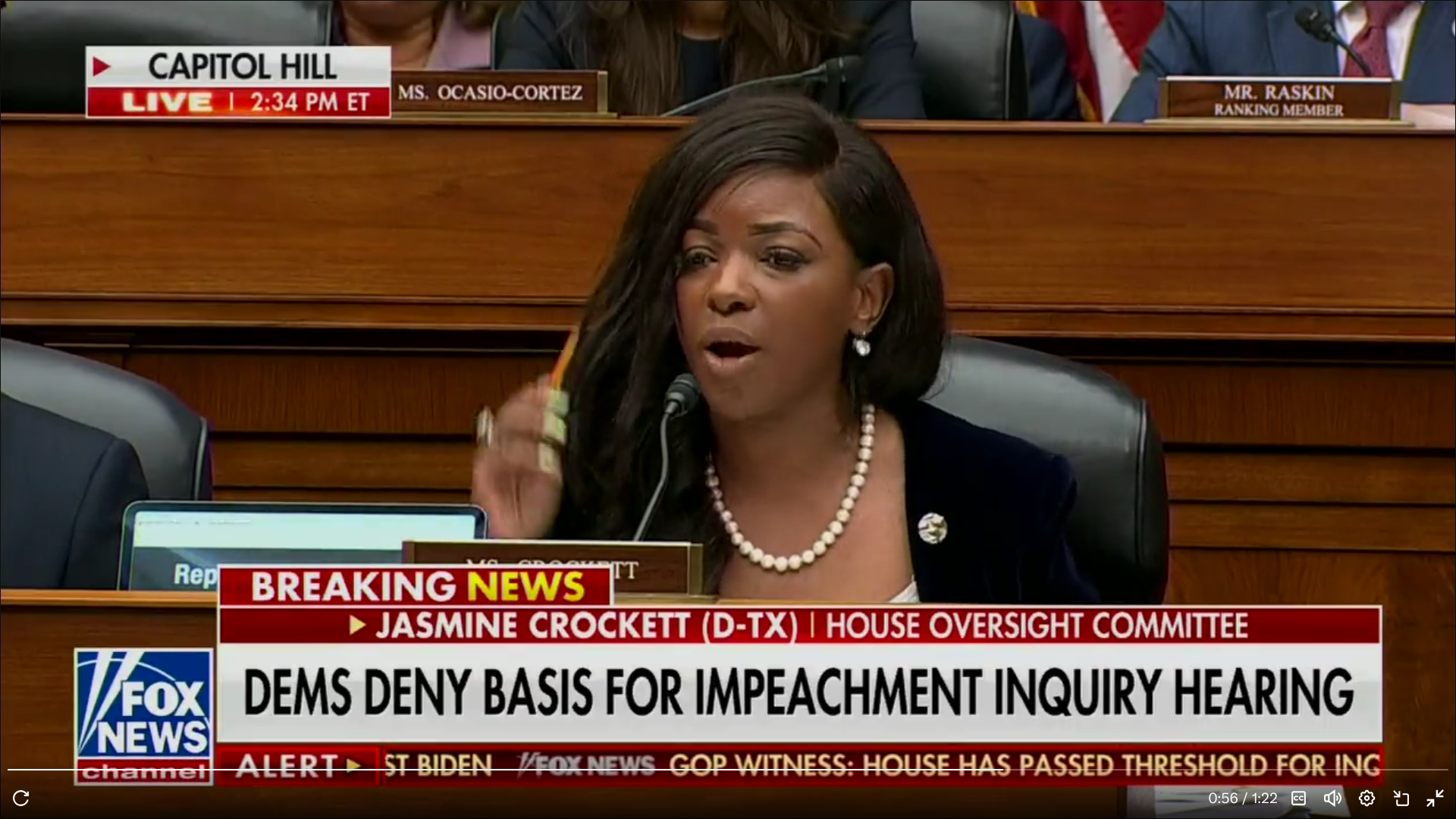
Screenshot/Fox News

Audio By Carbonatix
When local postal worker Eugene Gates Jr. collapsed on his route during a punishing heatwave in June, it seemed highly likely that the grueling weather had played a role in his death.
An autopsy revealed that both the heat and heart disease were to blame for the death of Gates, whose body temperature had soared to 104.6 degrees by the time he arrived at the hospital. The terrible incident spurred investigations into the U.S. Postal Service, including a congressional probe.
In July, U.S. Rep. Jasmine Crockett led a group of House Democrats in writing to Postmaster General Louis DeJoy. The lawmakers pressed for answers on USPS working conditions following the death of Gates, who was one of Crockett’s constituents.
Late last week, the Texas progressive sent DeJoy a follow-up letter outlining her concerns.
“Summer may be over, but extreme temperatures in Texas happen year-round – from suffocating heat to freezing cold,” Crockett explained in a statement to the Observer. “I am once again calling for answers from Postmaster DeJoy on the effectiveness of USPS worker protection policies, as well as inquiring on USPS’s ability to successfully oversee and comply with its own policies.”
Since her ascent to the U.S. House, Crockett has quickly carved out a national name for herself as a no-nonsense firebrand who’s more than willing to call out the hypocrisy of the GOP. Now the Congress member is applying that same fighting spirit toward securing greater protections for federal employees.
Crockett has previously pushed to safeguard folks from the extreme heat. This past summer, she locked arms with U.S. Rep. Colin Allred, a fellow Dallas Democrat, in urging Congress to act toward helping low-income people cover power bills as temperatures climbed.
In the Oct. 12 letter to DeJoy, Crockett cited some alarming statistics: Just “one-third of all current postal vehicles have air condition systems,” she wrote.
She also noted that the agency has stated it’s working on deploying “Next Generation Delivery Vehicles” and buying “commercial off the shelf vehicles.” However, she said it hasn’t vowed to give priority to areas with extreme weather.
“Moreover, no information was given as to repairing or retrofitting cooling systems in older vehicles that have yet to be replaced,” she continued in the letter. “It is alarming that USPS may believe that a four-inch-by-four-inch box [fan] would be sufficient to protect our federal employees from 100º+ Fahrenheit heat.” (The Texas Observer reports that around two-thirds of the nation’s USPS vehicles do not have AC, just said box fan.)
This past summer’s extreme heat was rough, and it’s likely to only get worse as climate change intensifies. Crockett has concerns about the efficacy and implementation of USPS’s Heat Illness Prevention Program. HIPP training is apparently required – yet only one of 19 mail workers surveyed by Dallas’ letter-carrier union said they’d received such training, according to the Texas Observer.
“Additionally, there are now questions regarding whether records were falsified by USPS to indicate employees completed their HIPP training despite not actually having done so,” Crockett wrote, again referring to the Oct. 11 Texas Observer story titled, “USPS Is Falsifying Safety Docs as its Workers Die of Heat.”
Gates was the seventh USPS carrier since 2012 to perish on the job from heat-related illness, according to that article.
“I am once again calling for answers from Postmaster DeJoy on the effectiveness of USPS worker protection policies.” – U.S. Rep. Jasmine Crockett
A little more than a month before his death, Gates had been penalized over a “stationary event,” according to WFAA. This occurs when tracker-equipped scanners determine that a letter carrier has become “idle.” Such workers may then be questioned about their productivity or supposed lack thereof and face potential penalties.
Gates received a disciplinary letter in May accusing him of a stationary event. It stated that if he didn’t shape up, he could be subject to certain “severe disciplinary actions, including removal from the Postal Service.”
The Occupational Safety and Health Administration has launched an investigation into Gates’ death.
“As temperatures continue to exceed dangerous levels in Texas and many parts of the country, employers need to act responsibly about their legal obligations to protect their workers from the well-known hazards of heat illness,” OSHA said in a written statement to The Dallas Morning News in late June.
OSHA is also looking into the suspected heat-related death of a UPS driver who collapsed while on his route outside Dallas in August.
In Crockett’s latest letter to DeJoy, she listed several questions for USPS, such as whether the agency will prioritize newer vehicles that offer both AC and heating units. She also asked what actions have been taken since Gates’ death to protect mail carriers’ safety amid extreme heat.
Reached for comment on Crockett’s letter, a USPS representative replied that the agency “will research the questions and provide a written response directly to the office of Rep. Crockett.”
The way Crockett sees it, nothing should come before the safety of workers: “The importance of ensuring that our communities and constituents receive their mail cannot be understated – nevertheless, demands for timely delivery should not come at the expense of the health and lives of our federal employees.”